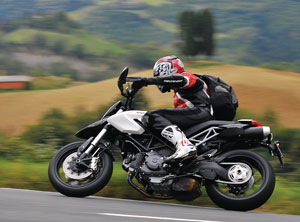
Ducatis tend to come in two sizes: small and large. You select the one that suits your appetite, like lunch- and dinner-sized entrées. Not hungry enough for an 1198? Go with the lower-calorie 848. Monster 696 doesn’t have enough protein? Belly up to the 1100. There are exceptions, of course. SportClassics and the new Ducati Streetfighter S only come in Hungry Man sizes, and the middleweight Multistrada was dropped in 2007.
No surprise, then, that Ducati has introduced the 2010 Hypermotard 796. The original 1100 hypersport/supermotard raised more pulses than a bevy of umbrella girls at the Milan Show in 2005, winning Best of Show. Since hitting showrooms in 2007, it has been a top seller. Ducati’s North American distributor pushed for the smaller Hy-mo, which is the only model besides the Monster 696 priced below $10,000. Just prior to the 2009 Milan Show, we flew to Ducati’s headquarters in Bologna, Italy, to evaluate the 796 on its home turf.
Ducati designed an all-new 803cc desmodromic two-valve, air/oil-cooled L-twin engine for the Hypermotard 796 with an 88mm x 66mm bore/stroke and a compression ratio of 11:1. It weighs 4.2 pounds less than the 696 motor thanks to narrow-profile crankcases and an 848-style flywheel. Breathing through a spacious airbox and 45mm throttle bodies, fuel injection is managed by a Siemens ECU. Exhaust gases pass through headers with twin lambda probes into a low-slung, catcon-equipped pre-silencer, and finally exit via twin underseat mufflers. Ducati usually does not report fuel economy figures, but it proudly proclaimed the 796 to be the most fuel-efficient Duc yet, achieving a claimed 51.5 mpg. Apparently, the new Desmodue’s fuel-sippin’ ways don’t come at the expense of power, either. Ducati claims 81.0 horsepower at 8,000 rpm, and 55.7 lb-ft of torque at 6,250 rpm. Despite its 275cc displacement advantage (1,078cc vs. 803cc), the Hypermotard 1100 produces 83.5 horsepower per liter vs. 100.9 for the 796, though both churn out about 70 lb-ft of torque per liter.

The 796’s 32.5-inch seat height (0.8 inch lower than the 1100) puts another check mark in the user-friendliness column. Seat height was reduced by reshaping the saddle only—chassis geometry, ground clearance and suspension travel (6.5 inches front, 5.6 inches rear) are identical to the 1100—yet it remains adequately padded. Bar risers and a motocross-style handlebar contribute to a comfortable, upright seating position that offers a commanding view. The 796 is 27 pounds lighter than the 1100—386 pounds dry, claimed—with weight savings split evenly between the engine and chassis. In place of the 1100’s rattling dry clutch, the 796 gets a wet, APTC (Adler Power Torque Plate) back-torque limiting clutch for smooth downshifts and light action at the adjustable lever.
Distinctive Hypermotard styling is retained, with a pointy proboscis, hand guards with integrated LED turn signals, folding bar-end mirrors and a single-sided swingarm. While innovative, the extended mirrors look like ears that stick out too far, and they are easily knocked out of position. The cockpit gets a fresh look with LED multifunction instrumentation and svelte switchgear, both from the Streetfighter. For those inclined to tart up their ’lil Hy-mo, Ducati abides with a 2-into-2 carbon fiber exhaust, an even lower seat (0.8 inch), footpeg sliders, rear luggage rack, Ducati Data Analyzer and cosmetic bits.
Our test route followed smooth, scenic roads in the mountains above Bologna. Holding only 3.3 gallons of fuel, the 796 felt light and slender, with easy handling. Although the throttle had some on/off abruptness, fueling was otherwise smooth and the torquey, compliant Desmodue emitted a pleasant exhaust burble. Negotiating tight, slow-speed curves was awkward due to tall lower gearing and a transmission that hadn’t broken-in yet. Operating the clutch lever with one finger was a snap, but it had a very narrow range of engagement.

Although undersprung and nonadjustable, the 43mm Marzocchi fork was capable enough. A similarly competent Sachs single rear shock is adjustable for preload and rebound, and it operates through a progressive linkage. Black wheels are 17-inch forged aluminum hoops made by Enkei, shod with Bridgestone BT-016 tires.
Not long after our first photo stop, we were besieged by pouring rain and cold, howling wind. Mercifully, initial bite was soft on the Brembo brakes—dual front 305mm semi-floating discs with radial-mounted four-piston calipers, and a single rear 245mm disc with single-piston caliper. Stopping power was easy to modulate on wet, leaf-strewn roads, and the Bridgestones provided reassuring grip. Both performed admirably once the pavement dried and the pace picked up later in the day.
Ducati wanted to build an accessible, versatile motorcycle that remains true to the company’s reputation for performance and style. And they’ve done just that. The 796 was fun to ride right out of the parking lot, and it was never intimidating when conditions deteriorated. Colors include matte black, matte black with matte white tank panels—both with black frames—and Ducati red with matching red frame. If this bike is your cup of espresso, it should be at your local Ducati dealership by the time you read this.
2010 Ducati Hypermotard 796 Specifications:
Base Price: $9,995
Website: ducatiusa.com
Engine Type: Air-cooled, transverse 90-degree L-twin, 2 valves per cyl.
Bore x Stroke: 88.0 x 66.0mm
Displacement: 803cc
Transmission: 6-speed, hydraulically actuated wet APTC clutch
Final Drive: O-ring chain
Wheelbase: 57.3 in.
Rake/Trail: 24 degrees/3.9 in.
Seat Height: 32.5 in.
Claimed Dry Weight: 368 lbs.
Fuel Capacity: 3.3 gals.
Average mpg (claimed): 51.5







